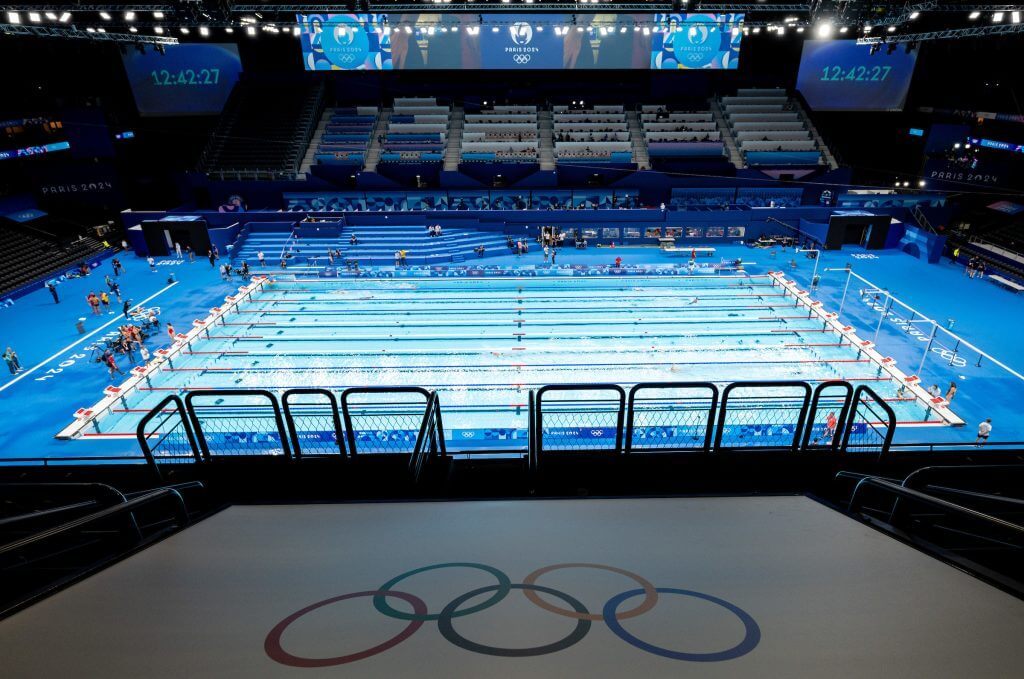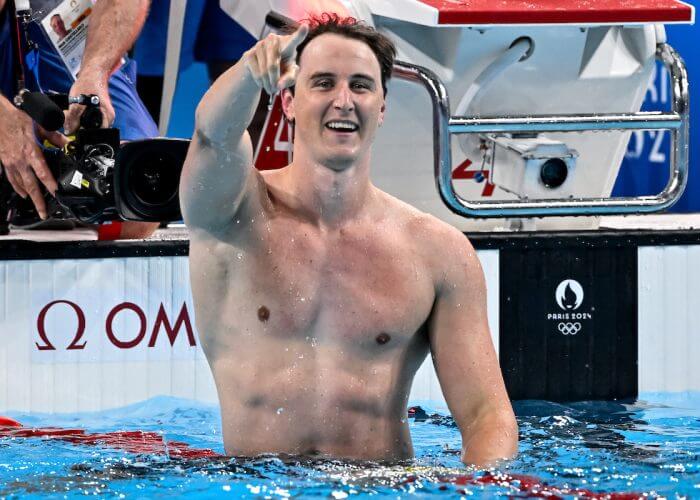Understanding the Potential Heartbreak and Resilience of Chasing the Olympic Dream

Understanding the Potential Heartbreak of Chasing the Olympic Dream
Will Licon is a world champion, Pan American Games champion and 11-time NCAA champion. Over the course of his career, he has proven his talent as a spectacular athlete.
In 2016, he finished third in the 200-meter breaststroke at the United States Olympic Trials, a heartbreaking 0.14 away from an Olympic berth. Five years later, Licon finished third in his pet event once again, 0.18 shy of booking a ticket to Tokyo. In 2024, Licon finished fourth at Trials, this time by 0.52.
Photo Courtesy: Peter H. Bick
In total, the former Texas Longhorn missed three Olympic teams by a combined .84. Despite all of this, he carried a veteran mindset into his post-race interview at Trials,
“I’m surrounded by a great groups of guys and I’ve been fortunate enough to be with (Coach) Eddie (Reese) for a decade now. You learn a lot along the way. You have goals, and you chase them. There has been a ton of naysayers along the way, but I still believe and feel I can be here and compete with the best. The day I step on the blocks and don’t think I can win a race is when I will stop.”
Should Licon swim four more years, he will be 33 years old, an age once considered advanced in the sport of swimming. Athletes like Gabrielle Rose, Brandon Fischer and many more are proving you do not have to be a teenager to achieve great things, setting the hopeful likelihood that we will see more of Will Licon in the coming years.
David Plummer
Let’s take things back a few years. In 2004, a 19-year-old David Plummer finished ninth in the 100 backstroke at the U.S. Olympic Trials. The former Minnesota Gopher swam to a spot in the final at the 2008 edition of the meet, but missed out on a top-two spot.
The 2010 season was the David Plummer banner year, as he won a national title in the 100 backstroke. This qualified him for the 2011 World Championships. With the retirement of backstroke legend Aaron Peirsol, Plummer seemed to be part of the future of the event for the United States. But 2012 saw him miss an Olympic berth by a margin of 0.12. Matt Grevers, the 2008 Olympic silver medalist, won the Trials final, while Nick Thoman finished second. Grevers and Thoman went on to win gold and silver in London.
Plummer took time off from the sport and traveled while sorting out whether he saw a future for himself in swimming.
The answer came in 2013, when Plummer won a national title en route to a silver medal at the World Champs. He continued to improve and in 2016, Plummer unleashed a monster swim in the Olympic Trials semifinal. In what was the fifth-fastest swim in history at the time, Plummer slammed a 52.12 to earn the top seed for the final. A father of two, he finished second in the final to officially book his ticket to Rio, where he won bronze individually and gold in the 400 medley relay.
The Shaine Casas Comeback
Shaine Casas broke out in 2019 with a 52.72 effort to win the U.S. national title in the 100 backstroke, etching his name into the stacked list of U.S. backstroke talent, a year before the Olympics.
The Olympics would not become a reality for Casas in Tokyo, as he finished third in the 100 backstroke and sixth in the 200 backstroke. The shortened Olympic quad was unique for the Texas-based athlete, as he medaled at the 2022 Worlds before just squeaking onto the 2023 team. A Chase Kalisz scratch opened the door for Casas to make the team in the 200 IM.
Come 2024, the stage was set for the talented athlete to make his Olympic debut. Casas missed out in his first few events in Indy, but placed his emphasis on the 200 IM for the latter portion of the meet. Sitting under world record pace for much of the final, Casas’ dream was realized, as he earned a spot on the team bound for the Paris Games.
The Australian Sprint Revolution
In 2016, Cameron McEvoy unleashed a 47.04 mark in the 100 freestyle to rate – at the time – third in the historical rankings. Come Rio, he finished well out of the medals, as his fellow Aussie, Kyle Chalmers, took gold.

Cameron McEvoy of Australia celebrates after winning the gold medal in the swimming 50m Freestyle Men Final during the Paris 2024 Olympic Games at La Defense Arena in Paris (France), August 02, 2024.
What followed was an undeniably difficult several years for the rocket scientist, as he failed to set a best time for nearly seven years and considered retirement from the sport.
In 2023, after a two-year hiatus, he clocked a 21.85 in the 50 freestyle to represent his fastest time in six years in the event. He then posted a 21.27 personal best a month later. Just one month later again, he blasted a 21.06 that marked him as the fourth-fastest performer of all-time. An individual gold in Paris capped off a stunning comeback for an athlete who nearly walked away from the sport.
2024 U.S. Olympic Trials
As a member of the media at the 2024 U.S. Olympic Trials, I was witness to some of the tightest competition in domestic history. Both sets of backstroke events saw heartbreak, as Jack Aikins finished third in both the 100 and 200 by a combined 0.19. Claire Curzan was a 2024 triple World Champion in the 50/100/200 back but found herself shut out of Paris. A.J. Pouch swam a 2:08.00 in the semifinals of the men’s 200 breaststroke, but added a second in finals to finish third. Matt King finished third in the 50 freestyle by just 0.01.
Dare Rose was third in the world in 2023 in the 100 butterfly, but finished third domestically in June, missing the team. Olympic champion Lydia Jacoby was denied a chance to defend her title by 0.27 in the 100 breaststroke.
Regan Smith became the fifth-fastest performer in the history of the 100 butterfly, but was shut out of making the team because Gretchen Walsh and Torri Huske ranked first and third.
The 1980 U.S. Olympic Team
Forty-four years later, the heartbreak of the 1980 Moscow Olympic Games has not been forgotten. The Olympic dream was ripped from hundreds of American athletes before they had a chance to chase it. Outside of swimming, hundreds of athletes across all sports never got to see their goals become a reality. While the complicated history of the year can fill up an article in itself, let’s highlight two athletes who persevered another four years.
Mary T. Meagher was 16 in 1980 and had only just begun her Madame Butterfly reign, owning world records in both the 100 and 200 fly for more than 15 years. With youth on her side, she was able to continue on to the 1984 and 1988 Games, winning three Olympic titles and five Olympic medals along the way. Her world record in the 200 butterfly would have finished fourth in Paris this year, speaking to her longevity and ahead-of-her-time skill.
Rowdy Gaines is arguably the most recognizable person in swimming not named Michael Phelps or Katie Ledecky. The voice for the sport since 1992, he has an undeniable legacy. After being vocal about his mental health struggles following the 1980 boycott, he rebounded in Los Angeles. Gaines won three gold medals and set an Olympic record in the 100 freestyle in the Olympic final.
While the 1980 U.S. Olympic team experienced a heart-wrenching sequence of politically charged events, the unfortunate circumstances played a role in fueling the fire of athletes to a home Olympics four years later.
What We Can Learn
As spectators, we are privy to a microcosm of an athlete’s career. The picture seems black and white, when in reality it’s much more complicated.
Missing an Olympic team can be crushing for an individual who has worked toward the title of Olympian for a large stretch of their lives. With the amount of talent the U.S. (and many other countries) possesses across the board, it’s no surprise that athletes who are contenders for Olympic gold medals are left home.
History will remember the Olympians, while often overlooking the hard work, blood, sweat, and tears that went into a third-place finish. Or even the 63rd-place finisher. More than 300,000 athletes are registered with USA Swimming. Only about 1,000 qualified for Trials this year. Only 46 made the Paris Olympic team. That means that roughly 0.001% of the athletes registered for USA Swimming made the Olympic team.
At those same Olympic Trials in Indianapolis, legendary swim coach Jack Baurele gave a talk with ASCA about his legacy and history in the sport. He highlighted how as a coach, he worked with athletes whose only goal was to simply make Trials, maybe earn a second swim. The variety of goals coming into a meet of the caliber of Olympic Trials share an equal level of validity.
Caeleb Dressel
In 2022, Caeleb Dressel withdrew from the World Championships in Budapest, and was not heard from for several months afterward. Fans wondered where he was, and what was unfolding.
Less than a year later, Dressel returned to the 2023 World Championships Trials, where he missed qualifying for the team headed to Fukuoka, Japan. More question marks came, including those concerning Dressel’s ability to reach his peak form. The most important thing, however, was his demeanor at Worlds Trials. He smiled, he laughed, and it was clear he was enjoying the sport again. For an athlete so often mentioned in the same sentence as Michael Phelps, having that sense of identity outside of swimming was crucial.
In 2024, Dressel showed further signs of his comeback. He finished third in the 100 freestyle at the Olympic Trials. He also won the 100 butterfly and 50 freestyle, swimming his fastest times in two years.
At the Olympics, while Dressel failed to individually medal, his relay performances were strong.
Men’s 400 Freestyle Relay: Anchored in 47.53
Mixed 400 Medley Relay: Prelims butterfly split of 50.10
Men’s 400 Medley Relay: Butterfly split of 49.41
It could not be denied that Dressel was still capable of delivering elite performances.
Conclusion
The Olympic dream is a complicated affair. Sometimes, things just don’t work out. What matters is understanding the time between Games that we aren’t privy to. Sometimes, it took everything an athlete had just to make it back to Olympic Trials, or to make a Trials final. Understanding the Olympic dream and the challenges that come with it can help shape swimming, and enhance the appreciation for those chasing an opportunity afforded to an elite few.




Reading the range of the years between Olympics and the athletes’ track record really put into perspective how much time and commitment is required to maintain their performance! Thank you for showing the determination of these individuals!